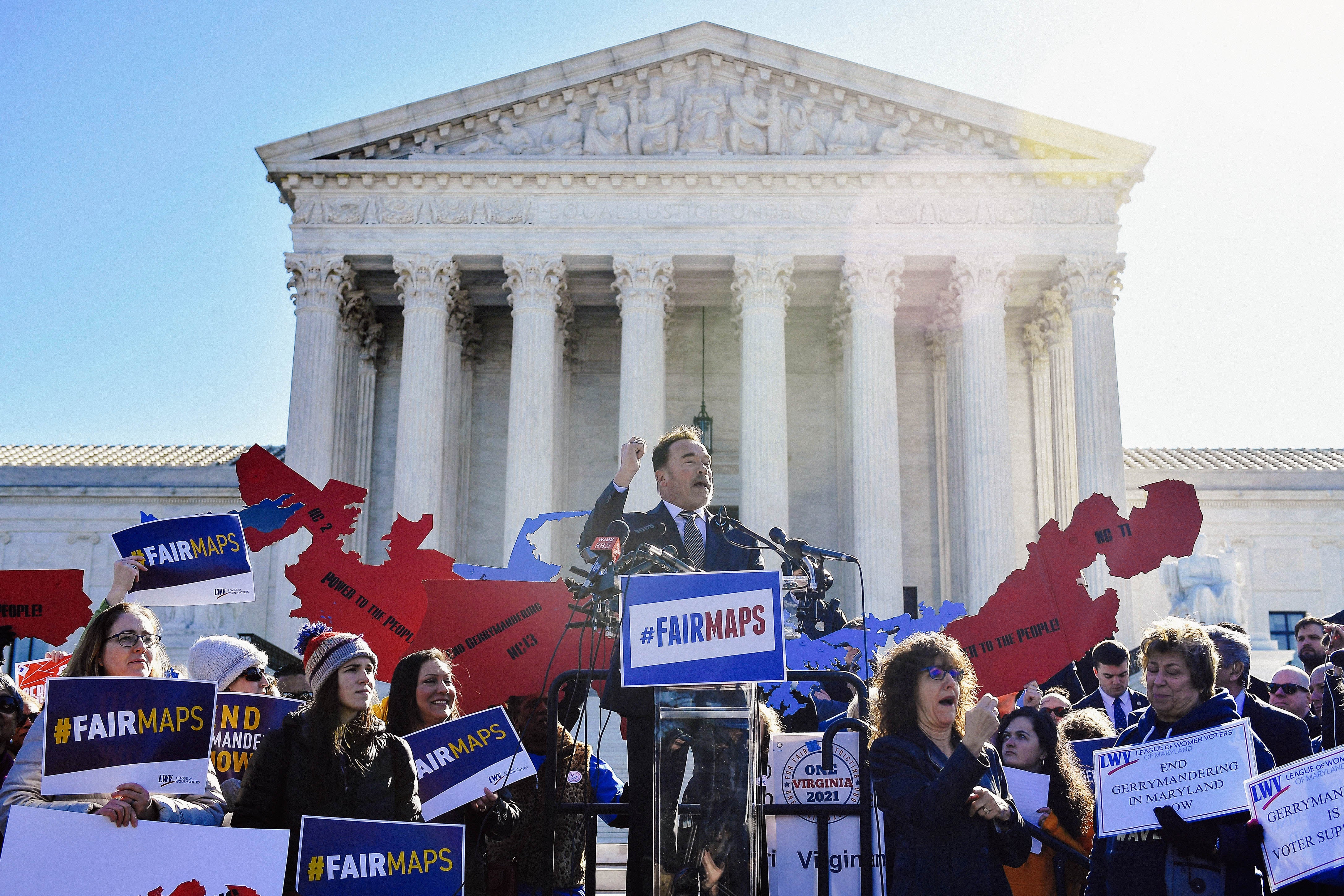Faced with the prospect of losing significant power in both their legislative and congressional gerrymandered maps, North Carolina Republicans have one grand plan: stall. In late September, shortly after a state court struck down the partisan gerrymander of the state legislature, a group of voters filed a lawsuit asking the same court to invalidate Republicans’ congressional maps, a move that would give North Carolina Democrats a fair share of seats in the House of Representatives. GOP lawmakers know the state courts are poised to reject their skewed districts. So on Monday, they tried to drag the case into federal court—arguing that any attempt to erase partisan bias from the congressional map would violate the voting rights of racial minorities.
This gambit requires some chutzpah. These are, after all, the very same lawmakers who crafted a voter suppression law that a federal appeals court found to illegally “target African Americans with almost surgical precision.” They are the same lawmakers who previously drew both legislative and congressional districts along racial lines so flagrantly that even Justice Clarence Thomas found them to be unconstitutional. And they are the same lawmakers who recently persuaded the U.S. Supreme Court that the federal judiciary cannot hear partisan gerrymandering claims.
And yet here they are, attempting to remove a partisan gerrymandering case to federal court, ostensibly because of their deep concern for minority voting rights. But there’s another motive at work here.
The North Carolina GOP has tried this maneuver before and failed. Republican lawmakers know that the North Carolina Supreme Court has a progressive tilt. They know the state constitution expressly protects the right of every voter to participate equally in free elections. And so they do not want the state judiciary hearing this issue. As a result, when activists challenged their legislative gerrymander in state court last year, Republicans tried to remove the lawsuit to federal court. U.S. District Judge Louise W. Flanagan promptly swatted them down, sending the case back to a state court—which later invalidated the maps under the North Carolina Constitution.
At the time, Flanagan explained that Republican lawmakers (and their lawyers) had fundamentally misunderstood how our court system works. When a plaintiff brings a claim that rests exclusively on state law, it must be heard in state court. Because the voting rights advocates’ claim rested solely on the North Carolina Constitution, the federal courts had no power to hear it.
Despite this resounding defeat just nine months ago, the North Carolina GOP has mounted an identical argument in a last-ditch effort to keep its congressional gerrymander out of state court. (The Republicans are facing off against their frequent foe, the National Redistricting Foundation, an organization founded by former Attorney General Eric Holder that is backing the lawsuit.)
Republican lawmakers are essentially arguing that any effort to draw a fair map would intentionally discriminate against minorities in violation of equal protection. Lawmakers also assert that the Voting Rights Act compels the preservation of gerrymandered districts that contain large black populations. But the U.S. Supreme Court already repudiated this theory in 2017’s Cooper v. Harris, ruling that North Carolina Republicans cannot justify their gerrymanders by hiding behind the VRA. No plausible reading of Harris obliges legislators to keep black voters packed into a handful of districts in the name of racial equality.
Lawmakers are also aware that the 2020 election is just around the corner, and any remedial map must be crafted in time for the March primary. So they are attempting to draw out this litigation until it is too late to implement fair districts.
The ploy might work better this time around. Lawmakers keep filing in the Eastern District of North Carolina, where there are only three active judges—all appointed by Republican presidents. Last time around, they drew Flanagan, the only moderate. This time, they drew Judge Terrence Boyle. A protégé of reactionary Sen. Jesse Helms, Boyle is notorious for ruling against voting rights, drawing reversals and criticisms from higher courts. The plaintiffs will likely try to transfer the case to Flanagan, given its close connection to the earlier dispute. But Boyle could cling to it for long enough to run down the clock, depriving the North Carolina courts a chance to impose a new congressional map before the 2020 election cycle begins.
It is no mystery what Republicans are up to here. The legislators who targeted black voters “with almost surgical precision” have not suddenly discovered a deep-seated concern for minority suffrage. They simply want to maintain their congressional map by any means necessary. And why wouldn’t they? The current map contains 10 Republican districts and just three Democratic ones, even though the state is divided almost evenly between each party. State Rep. David Lewis, who helped create the map, explained his work this way: “I think electing Republicans is better than electing Democrats. So I drew this map to help foster what I think is better for the country.”
In June, the U.S. Supreme Court refused to stop such extreme partisan gerrymandering, turning away a challenge to North Carolina’s congressional map. At the same time, the majority suggested that state courts could fill in the gap. North Carolina’s last, best hope for redistricting reform lies in its state judiciary. If Boyle lets this case wither on his docket, that hope will be snuffed out.
